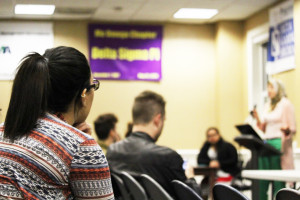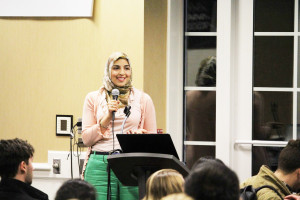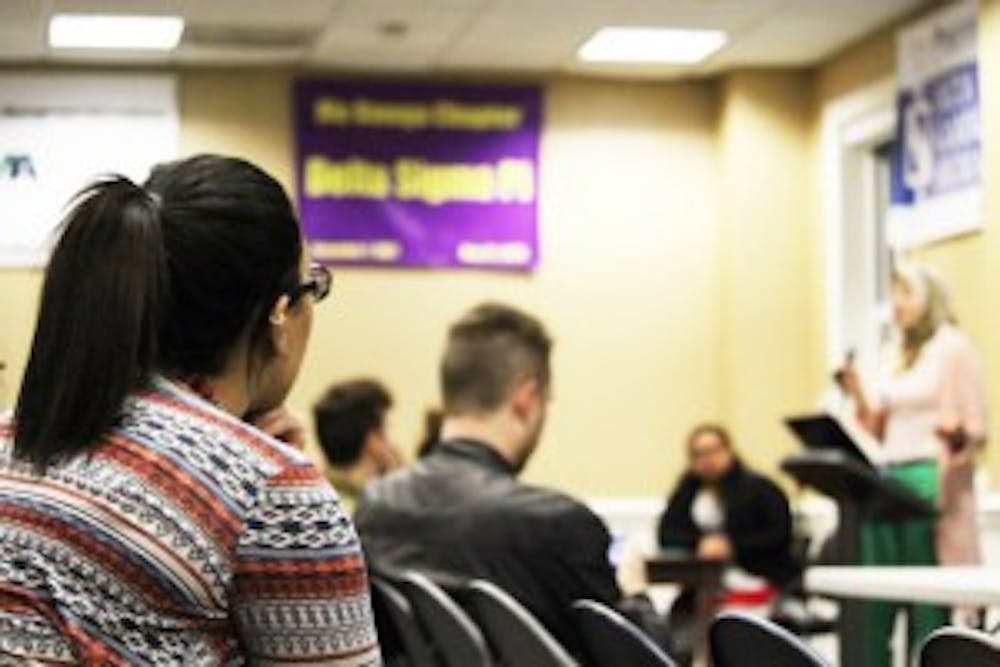By Elizabeth Zakaim
Staff Writer
How many of us living in this country grew up without electricity? How many lived in a home without running water? How many of us had to skip a meal for lack of food?
These were questions raised at the Immigration Monologues held on Tuesday, March 29, in the Business Building Lounge. The event was organized by a group of Bonner scholars from the College who volunteer to teach English as a Second Language classes at El Centro, a learning center in Trenton, N.J.
One Bonner scholar, sophomore deaf education and sociology double major Yuleisy Ortez, proposed the idea for the event after hosting a similar one last year that helped dispel stereotypes associated with immigrants.

“We had a great turnout (last year) and wanted to continue to bring the issue of immigration to light on our campus,” Ortez said. “I proposed that we do Immigration Monologues to give a face to the stories of immigration that many of our students either have experienced themselves or have some experience with.”
One speaker, a sophomore international studies major, is a native, or “indio,” of Costa Rica and has chosen to remain anonymous in the retelling of his story.
“Indio means I am descended from Amerindian — in my case specifically, the Bribri-Talamanca tribe,” he said “There are many differences between Latinos and Indios, as Indios are often forgotten when talking about Latin American countries.”
He described his house, a banana-leaf shack, and how his childhood pastimes included climbing mango trees and playing “pass the dirt,” his version of hot potato.
“As I look back at growing up there, I cannot think badly of my experiences. If I am honest, I don’t believe my particular circumstances have made me any stronger than anyone else,” he said. “People sometimes have a preconceived notion that third world hardships and second world hardships are worse than first world ones, but in living in these two different conditions, I can say that the first world still experiences poverty, violence, disease, trauma and disaster.”
The Costa Rican native was six when he came to the United States.
“Assimilating was and still is difficult, as a part of my being is in love with American culture, while the other half resists and tries to honor my roots,” he said. “I miss the warmth of my home there, the fresh food, the community-oriented people and the general acceptance of the people in my society. I would say, though, that however much I miss those things, I am and will forever be an American.”
Assimilation is a hardship all immigrants have to face. Junior communications major Natasha Piñeiros spoke to the audience about the challenges that she and her family faced while emigrating from Ecuador.
“It was really tough,” Piñeiros said. “I was used to my parents being really involved in my school affairs. My family was well-known in my town and never did I have to think about people having different cultures or languages. It was navigating through the airport in the U.S. where I began to realize how my life was taking a 360.”
Because she spoke the most English in her family, Piñeiros had to take on a lot of responsibility that would normally fall on her parents.

“I translated for my parents all the time. It all began as soon as we stepped out of the airplane. I (would) translate documents for them, attend doctor appointments with them and I’m really the only person who has had contact with our landlords over the years,” Piñeiros said. “It has helped me mature so much. You don’t have 13-year-old kids talking about tax returns, lease or permanent residency paperwork. But I had to pick it up, and quick. This helped me think differently about my identity.”
Senior business management major and Bonner scholar Talia Martinez helped coordinate the event and also spoke at the monologues. Martinez shared the story of how her mother was deported back to Mexico when Martinez was 11 years old and said that her family is still coping with the loss.
“I spent many days traveling to many different lawyers, trying to see if we could find some way to bring my mom back,” Martinez said. “Holidays were very tough and my family had to overcome being physically apart.”
Martinez said that until recently, it was hard for her to open up and tell her story to others. Hearing an insensitive joke about immigrants from a peer, however, changed her perception of her past. She then realized that she should be sharing her story with others who can listen and relate to her hardships.
“I started to think about all the jokes I’ve ever made and how real they actually are,” Martinez said. “In the beginning, when my mom was first deported, I kept it a secret because I didn’t want people to judge me. I later realized that she did nothing wrong. She had not hurt anyone, so why be ashamed? Now I take it as an opportunity to inform people about immigration (and) the sad side to deportations.”
The Immigration Monologues not only gave students who have emigrated from outside the country a platform with which to share their experiences, but also allowed their peers to learn from these personal stories.
“It is important to hear these perspective because this is a human issue and those who aren’t directly affected (by) it do not know about the process and how hard and difficult it can be to immigrate,” Ortez said. “These monologues open the minds of those attending and give the audience a different perspective from the eyes of the speakers.”







